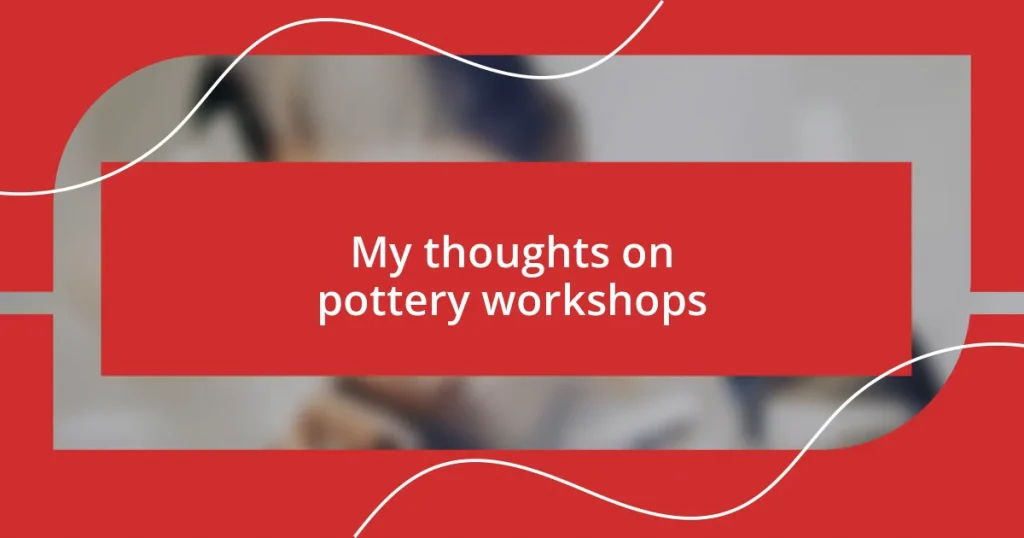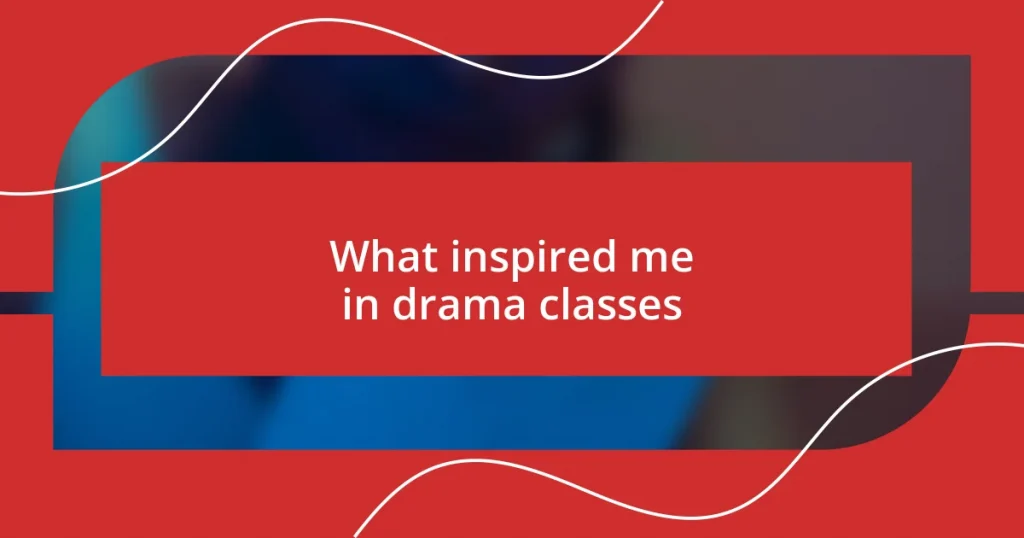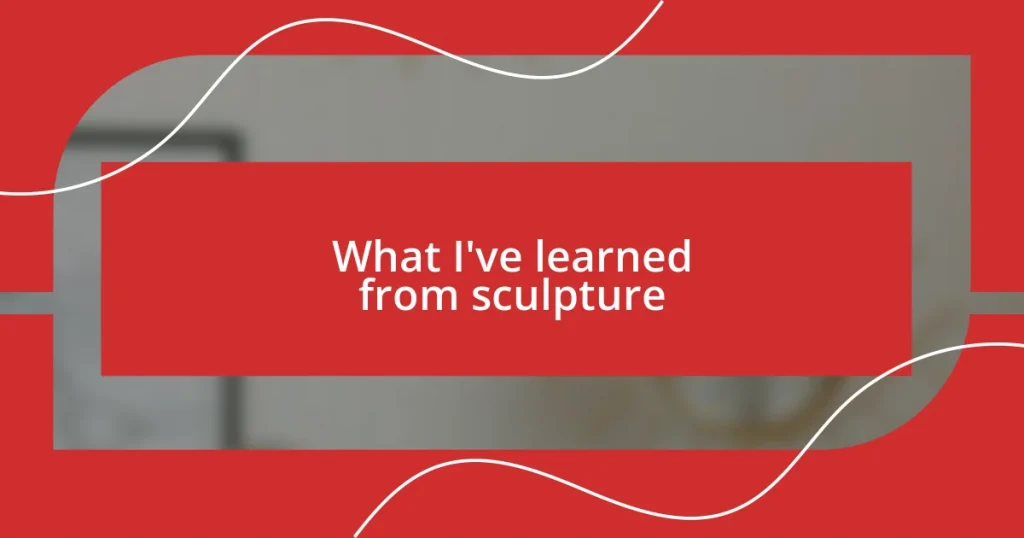Key takeaways:
- Pottery workshops foster a strong sense of community and connection, enhancing creativity through shared experiences.
- Engaging in pottery offers therapeutic benefits, providing stress relief and promoting mindfulness through the tactile process of shaping clay.
- Choosing the right workshop and actively seeking feedback are crucial for personal growth and skill improvement in pottery practice.
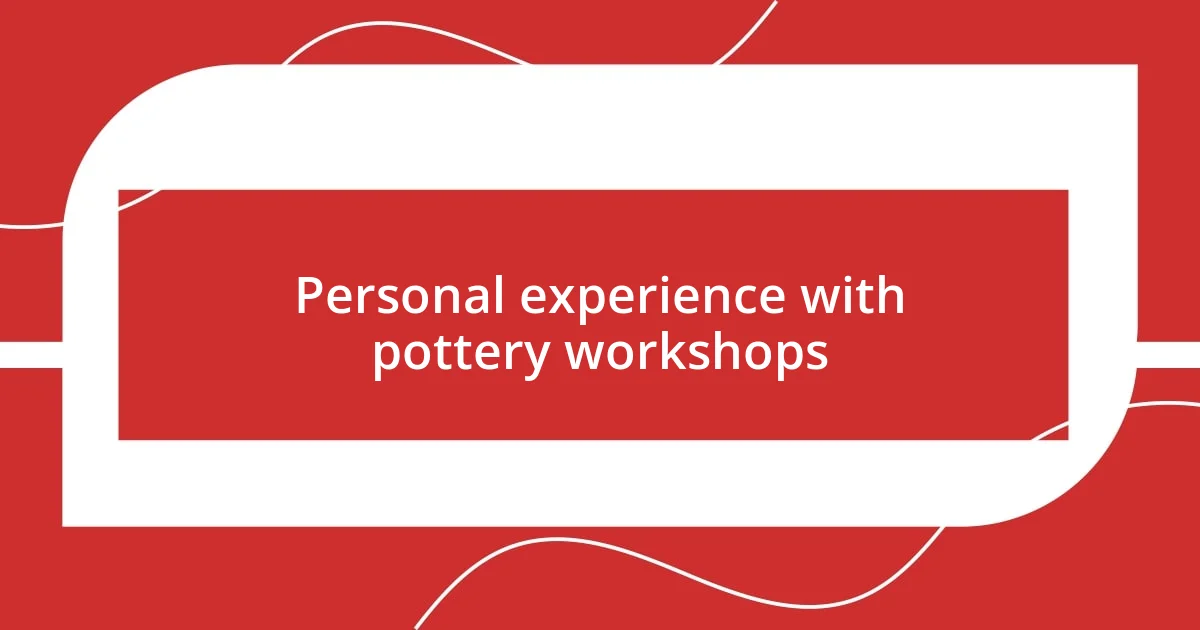
Personal experience with pottery workshops
My first pottery workshop was a delightful surprise. I walked in expecting a simple art class, but what I found was a whirlwind of creativity and connection. As I shaped that first lump of clay, I felt a rush of calm wash over me; it was almost meditative. Isn’t it amazing how something as simple as molding clay can ground you?
During my second session, I stumbled upon a technique that totally transformed my approach. I remember the moment the instructor demonstrated how to pull the clay upwards on the wheel. I was a bit skeptical at first—could I really do that? But as I tried, something clicked, and suddenly, I was not just a novice; I was a creator in that moment. It made me wonder how many of us hold ourselves back without even realizing it.
One of my favorite memories involves a group project where we all collaborated on a large piece. We each added our touch, and witnessing my classmates’ interpretations was both inspiring and humbling. I had never felt such a strong sense of community before; it made me question: how often do we miss these beautiful connections in our everyday lives? Pottery opened my eyes to the joy of shared creativity, something I cherish deeply today.
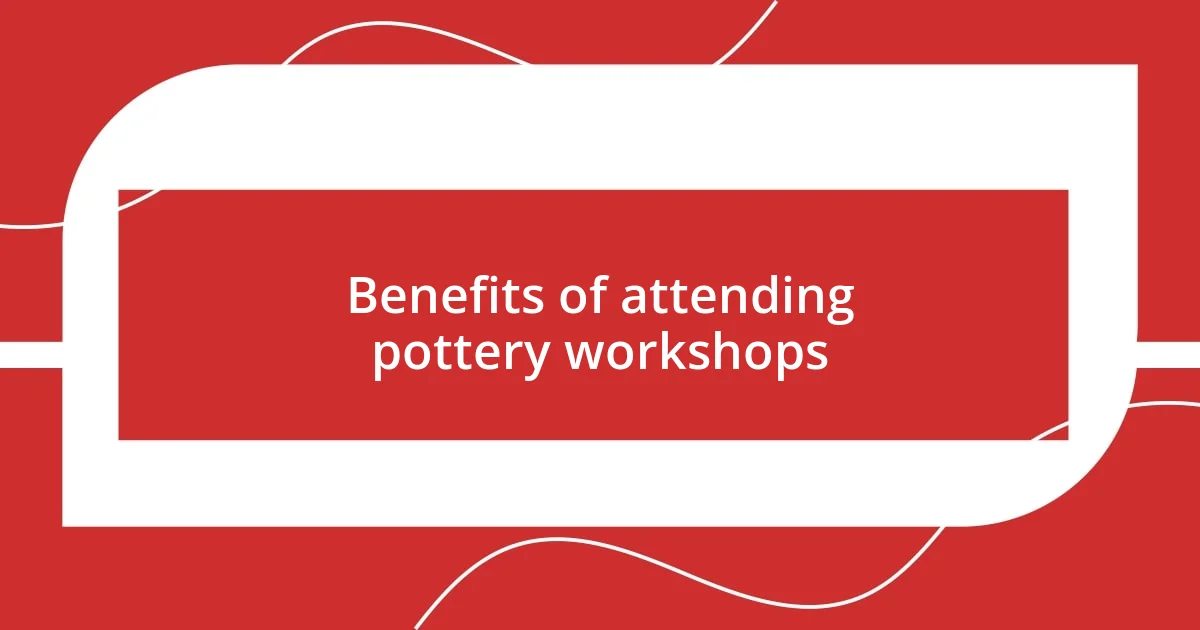
Benefits of attending pottery workshops
Attending pottery workshops has numerous benefits that extend beyond just learning to craft with clay. For instance, I distinctly remember the warmth I felt as I walked into my first group session. The atmosphere buzzed with enthusiasm, and each person’s energy seemed to spark my own creativity. I found that working alongside others not only improved my skills but also ignited a sense of belonging that I had been craving. Who knew a simple class could foster such a strong connection?
Another perk I discovered was the therapeutic value of pottery. During one particularly hectic week, I found solace in shaping clay with my hands. That tactile experience helped me stay present and cleared my mind of stress. I often tell friends about the surprising relief that comes when you let your hands work while your thoughts quiet down. It’s almost like a form of mindfulness, where the rhythm of the wheel draws you into a peaceful state of flow.
Finally, I’ve found that pottery workshops can boost your confidence in ways you might not expect. I recall the first time I presented my work at the end of a session. Nervously, I showed my piece to the group, unsure of their reaction. But when they praised my creation, I felt an exhilarating rush. That moment taught me that stepping out of my comfort zone and sharing my work with others is a powerful way to grow. Can you relate to those butterflies you feel when trying something new? It’s in those moments that I truly learned the importance of celebrating both our successes and our imperfections.
| Benefit | Personal Insight |
|---|---|
| Community Connection | Fostering friendships and shared experiences enhances creativity. |
| Therapeutic Effects | Molding clay relieves stress and promotes mindfulness. |
| Boosting Confidence | Sharing my work cultivates self-esteem and personal growth. |
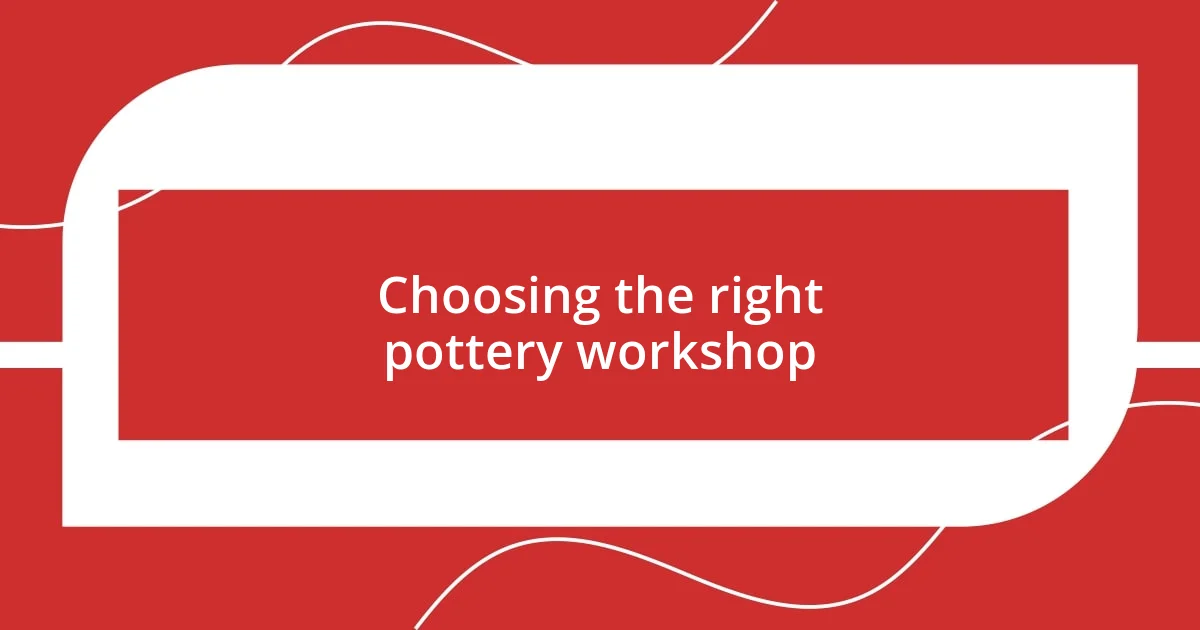
Choosing the right pottery workshop
Choosing the right pottery workshop can greatly influence your experience. I remember the excitement I felt while browsing through various options online, looking for a workshop that resonated with my artistic aspirations. It’s important to consider factors like the instructor’s qualifications and the workshop’s environment. A supportive atmosphere can make a world of difference in how comfortable you feel to express yourself creatively.
Here are some key points to help you in your decision-making:
- Instructor Experience: Look for workshops led by skilled artisans who are passionate about teaching. A great instructor can inspire and guide you through your learning process.
- Class Size: Smaller classes often mean more personalized attention. I’ve found that having the chance to ask questions and receive feedback in a cozy setting enhances my learning.
- Focus Areas: Consider what you want to learn. Some workshops specialize in wheel throwing, while others may concentrate on hand-building techniques. Having a clear goal can make your experience more fulfilling.
- Materials Provided: Check if the workshop supplies all the necessary materials, including clay and tools. I once attended a session where I had to bring my own supplies, which added an unnecessary layer of stress.
- Atmosphere: Visit or research the studio to get a feel for the environment. I’ve always felt more creative in spaces that are visually inspiring and welcoming.
Your choice will ultimately shape your pottery journey, so take the time to find what feels right for you.
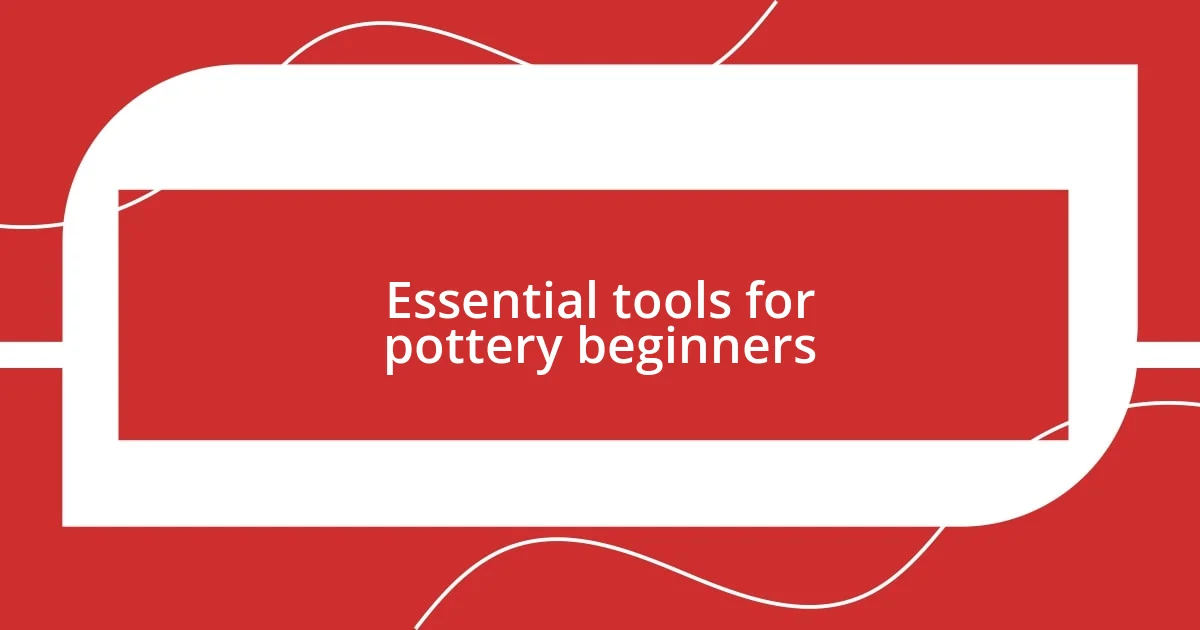
Essential tools for pottery beginners
When starting your pottery journey, there are a few essential tools that can make all the difference. A good-quality clay knife is a must-have; it’s not just for cutting but also shaping and trimming your creations. I remember the first time I bought one—it felt like I was finally stepping into the world of serious pottery. I used to wonder why some tools were deemed essential, but once I tried it, everything clicked into place.
Another tool I lean on is a rib. It’s incredible how this simple piece can help smooth out the surfaces of my pieces, making them look so polished. I can recall the satisfaction I felt when I used a rib on a bowl for the first time; the texture transformed from rough to effortlessly elegant in just a few swipes. Have you ever found a tool that made your work feel more professional? That’s how I felt, and it definitely boosted my excitement to continue creating.
Lastly, don’t underestimate the importance of a wheel if you’re interested in throwing pottery. There’s something exhilarating about centering the clay and the rhythm of the wheel itself. I remember my first attempt at throwing; it was messy and fast-paced, but the thrill was unbeatable. The wheel is truly the heart of pottery for many of us. Do you think you’d enjoy the feeling of transforming a lump of clay into a masterpiece?
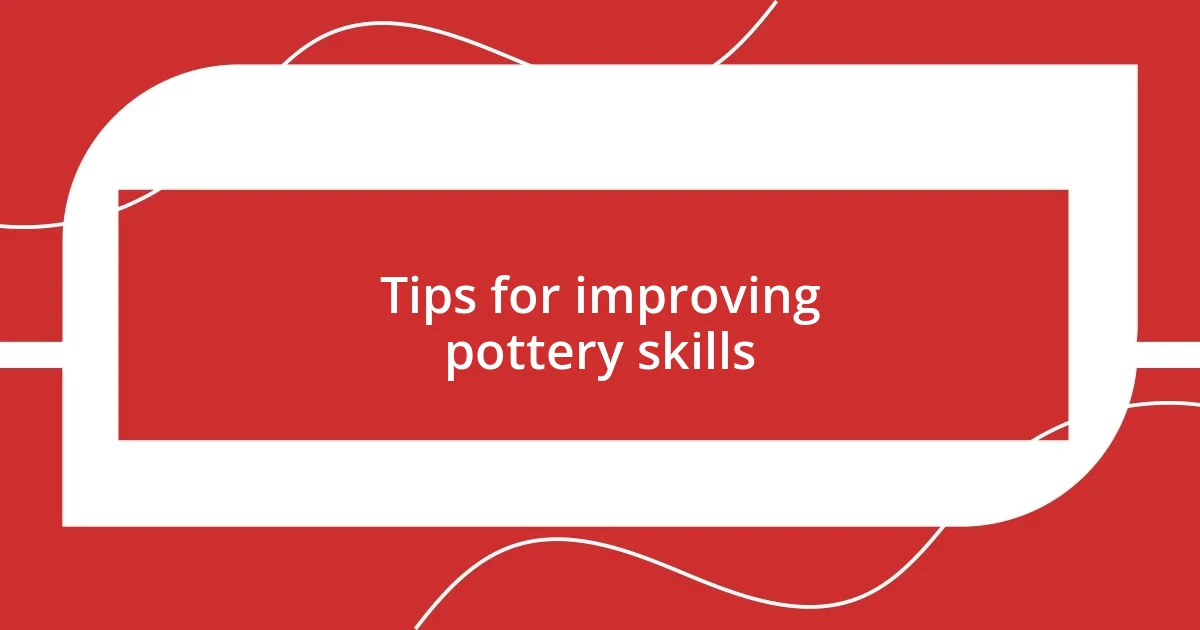
Tips for improving pottery skills
Improving your pottery skills requires practice and patience. One of the most effective strategies I’ve found is regular practice. I remember dedicating specific days of the week just to pottery; it transformed my approach. The more you throw or hand-build, the more you’ll discover your unique style and refine your technique. Have you thought about setting aside time each week for pottery? It truly can make a world of difference.
Another tip is to seek constructive feedback. I had a breakthrough moment when I started sharing my work with fellow potters in a forum. Their observations helped me see things I didn’t notice, like how to better balance my pieces or improve my glazing techniques. Embracing feedback can feel daunting, but it’s a vital step toward growth. Why not reach out to someone you admire in pottery and ask for their thoughts? You might receive insights that elevate your craft.
Lastly, don’t shy away from experimenting with different styles and techniques. I once spent an entire weekend trying out alternative glazing methods, and it was one of the most rewarding experiences I’ve had. The unpredictability of how each piece would turn out added excitement to the process. What’s the worst that could happen? You might surprise yourself and create something beautiful—or at least learn something new! Embrace mistakes as part of your journey, because every stumble offers a chance to grow.
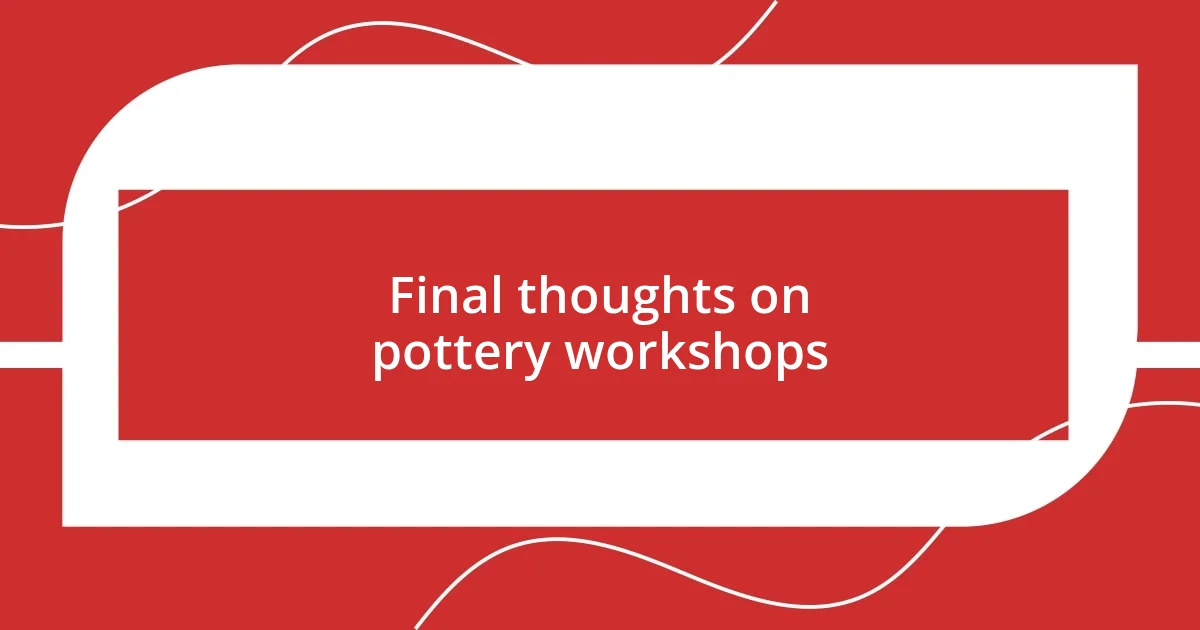
Final thoughts on pottery workshops
I’ve had so many enriching moments in pottery workshops that it’s hard to capture it all simply. The camaraderie and shared enthusiasm among participants often lead to unexpected friendships, and I still keep in touch with people from my very first workshop. Isn’t it amazing how a common interest can bring people together?
Reflecting on the learning curve, I remember the wobbliness of my first few pots—they were laughably misshapen! But that process was beautiful in its own right. Each misstep taught me something valuable, showing that mastery isn’t just about skill; it’s about embracing the journey and the joy of creation. Have you ever found beauty in your imperfections? It’s a lesson I carry with me even now.
Ultimately, pottery workshops are about personal growth as much as they are about the craft itself. The hands-on experience, paired with the guidance of a skilled instructor, can ignite a passion you didn’t even realize you had. I often hear newcomers express how liberating it feels to manipulate clay with their hands—have you felt that joy yet? It’s a transformative journey worth taking, full of surprises and discoveries.










